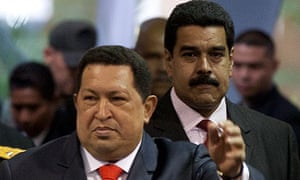
Hugo Chavez - Nicholas Maduro
https://www.foxnews.com/media/venezuela-what-happens-when-socialism-fails
In 1998, a career military officer was elected president of the wealthiest country in Latin America on a platform of socialism. It
was an election victory that shocked the world, as many believed that
the catastrophic failure of the Soviet Union had closed the book on
socialism as a form of government.
"The philosopher Francis Fukuyama famously declared that history itself had ended," narrated Fox News anchor Bret Baier in Fox Nation's "The Unauthorized History of Socialism."
"Western liberal democracy had emerged, as what he called, the final
form of human government," continued Baier, "But did the collapse of
communism really mean the end of socialism?"
Today,
Hugo Chavez is gone, but his socialist "Bolivarian Revolution" drags
on, trapping oil-rich Venezuela in an escalating state of crisis.
After assuming power, Chavez instituted a traditional socialist
agenda, hiking taxes, nationalizing private industries and
increasing spending on social programs to 40 percent of GDP.
From 2007
to 2010, the Chavez regime seized majority control of four massive oil
projects and American-owned oil rigs, and implemented a new tax on oil
production, among other measures.
"Chavez won four national
elections in a row," said Baier in the Fox Nation piece, "But when oil
prices fell, the flaws of what was now called Chavismo were starkly
revealed."
"What happens is that concentrated power and coercion that is a
necessary part of socialism will distort the economy and then breed the
need for more power for the government in the future to try to correct
the inefficiencies that they've created in the past," argued American
Enterprise Institute scholar Mark Perry.
"Once the government
starts to take over the economy, and uses force and coercion and creates
distortions that breed future government interventions to correct their
past mistakes, and then you're down the road to serfdom," said Perry.
Chavez died in 2013 and his successor, Nicolas Maduro, a former bus driver, doubled down on Chavismo.
In
2018, 80 percent of the country was living below the poverty line and
the annual rate of inflation reached 1 million percent, rendering the
wealth of most Venezulan's nearly worthless.
A study published by
the United Nations on Sunday found that one of out every three people in
Venezuela is unable to secure enough food to meet their daily basic
dietary requirements.
The assessment,
conducted by the U.N.'s World Food Programme, found that 9.3 million
people are "food insecure." Seventy percent of Venezuelans said that
while food is available, they cannot afford it.
"The economy
imploded and the country has collapsed to the point that it is
generating more refugees now than the Middle East, than Syria," said
Niall Ferguson, a senior fellow at the Hoover Institution.
In fact, in the last three years, 15 percent of the population of Venezuela has fled the country.
"It's
been a catastrophe and it's a catastrophe that was predictable if you
understood what socialism does," concluded Ferguson. "I think it is
important because so few people on the left in Europe and in the United
States recognized Chavez for what he was."
To watch the entire six-part series, "The Unauthorized History of Socialism" go to Fox Nation and sign up today.
No comments:
Post a Comment